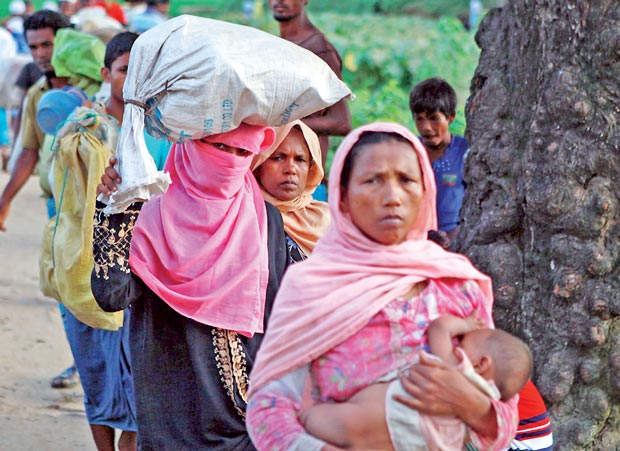Reply To:
Name - Reply Comment
Last Updated : 2024-04-26 14:18:00
 A great deal of phobia has been generated throughout the world about refugees and immigrants. Both in the West and the East, refugees are seen as an unbearable economic burden, as job snatchers, environmental and cultural polluters and as terrorists. But actual experience tells another story – that they have been an asset and not a threat, and that host countries have been gainers and not losers.
A great deal of phobia has been generated throughout the world about refugees and immigrants. Both in the West and the East, refugees are seen as an unbearable economic burden, as job snatchers, environmental and cultural polluters and as terrorists. But actual experience tells another story – that they have been an asset and not a threat, and that host countries have been gainers and not losers.
The notion that refugees are a security threat appears to be fairly new – as a result of the world’s growing conflict with Islam and Islamic countries. Whole groups of Muslims, including women and children, who had fled from violence and persecution in their countries of origin are now seen as “Jihad terrorists.” They are either driven back at the border with stun grenades, or rounded up and deported to face persecution and violence in the country they had fled from. Boat people are turned back or put in isolated camps.
The emergence of nation states with inviolable borders and narrowly defined “nationalities” has created notions of “We” and the “Other”. Political and economic power structures are being on ethnicity, or religious and linguistic affiliations, empowering some communities and marginalizing others.

Notions of “We” and the “Other” dictate who should be included and who should not in sharing political or economic resources and who should be admitted to the country and who should not.
US President Donald Trump has come down hard on potential visitors from some Muslim countries. India has given citizenship to persecuted Hindus, Sikhs and Buddhists from neighbouring countries or allowed them to enter and stay put, but is seeking to deport 40,000 Rohingya Muslims from Myanmar on the plea that some of them could be Islamic terrorists guided by Jihad groups in Pakistan. Sri Lanka has taken into “protective custody” 31 Rohingyas - mostly women and children, who were derided as terrorists and attacked by Sri Lankan nationalists.
Governments point out that migration may not always be due to persecution and violence. The push factor could be a need to look for fresher economic pastures. And it could well be organized by touts and professional human traffickers as is seen even in the case of the Rohingyas.
But migration takes place only from economically backward countries to countries which offer opportunities, and from countries which are torn by conflict to those which are peaceful, from where death is knocking at the door to where life is assured. 99% of those who seek refuge are frightened rabbits, not hard core terrorists.
When Sri Lankan Tamil refugees in India were subjected to police surveillance, aid worker S.C.Chandrahasan said: “They are not terrorists, they are people running away from war to live in peace somewhere else!”
In an article in The Indian Express, historian Rajmohan Gandhi warns that if such phobias against a whole people are allowed to thrive, there is a danger of one’s group also becoming a target of the scourge of intolerance one day under different circumstances.
Referring to India’s bid to deport 40,000 Rohingyas, Gandhi says that this step will expose hazards to Indians living in dozens of other countries.

“Today, they come for the Rohingya. Tomorrow they may come for the Indians, of whom there are many even in Myanmar, in different parts of that land. Whether they live in India or elsewhere, people of Indian origin have an enormous stake in the legal principle that no one may be discriminated against, or punished, for being linked by blood, ethnicity or religion to a criminal or terrorist,” he asserts.
“To welcome a Chakma refugee from Bangladesh, who by religion may be a Buddhist, and a Tamil from Sri Lanka, who perhaps is a Hindu by religion, but deny entry to a Rohingya pushed out of Myanmar, who happens to be a Muslim, would appear to flout the Constitution, not merely the law of humanity” Gandhi argues.
Host Countries Gain Too
Studies have shown that as a group, immigrants and refugees have brought prosperity to the countries they had moved to. The Gulf Region would not be what it is today without the millions of Indians, Pakistanis, Sri Lankans and Filipinos working there.
Indian immigrants have brought prosperity to the countries they had migrated to – as plantation workers in Sri Lanka, Fiji and the West Indies; as traders in East Africa and as professionals in the US. There are 360,000 Bangladeshis working in Malaysia to enable that country to enjoy prosperity.
Migration takes place only from economically backward countries to countries which offer opportunities, and from countries which are torn by conflict to those which are peaceful
The 2.8 million Indian immigrants in the US, are among the wealthiest communities there, with a median annual household income of $88,000 compared with the US national median of $49,800, says the BBC. The services and taxes rendered by Indian Americans keep the US economy ticking.
Contrary to the popular belief, immigrants do not bring down the wages of the native workers. Writing in the journal of the Federal Reserve Bank of San Francisco, Geovanni Peri, says that immigration to the United States between 1990 and 2007 was associated with a 6.6% to 9.9% increase in real income per US worker.
“That equals an increase of about $5,100 in the yearly income of the average U.S. worker in constant 2005 dollars. Such a gain equals 20% to 25% of the total real increase in average yearly income per worker registered in the United States between 1990 and 2007,” Peri says.
Research by UCLA Professor Raúl Hinojosa-Ojeda shows that legalizing the undocumented immigrant population in the US, and reforming its legal immigration system, would add a cumulative US$ 1.5 trillion to the US GDP over a decade.
The study shows that big gains occur because legalized workers can earn higher wages than undocumented workers, and they will use those wages to buy things such as houses, cars, phones, and clothing. As more money flows through the U.S. economy, businesses grow to meet the demand for more goods and services, and more jobs and economic value are created.
Hinojosa-Ojeda found that the tax benefits from legalization would alone be between $4.5 billion and $5.4 billion in the first three years.
Research by Notre Dame economists Juan Carlos Guzmán and Raúl Jara finds that passing the DREAM Act by the US Congress would add US$ 329 billion to U.S. economy by 2030.
The DREAM Act could provide a double boost to the economy: First, DREAMers will be able to work legally (generally at higher wages), and second, because of the requirement to complete high school and some college or military service, they will have more education and training, which translates into better and higher-paying jobs. All of these extra wages circulate through the economy, supporting new job creation for the native born as well, they said.
2.8 million Indian immigrants in the US, are among the wealthiest communities there, with a median annual household income of $88,000 compared with the US national median of $49,800
According to the National Foundation for American Policy, immigrants will add a net US$ 611 billion to the Social Security system over the next 75 years. Social Security will not be bled as feared.
“Immigrants are a key driver of keeping the Social Security Trust Fund solvent, and Stuart Anderson of the National Foundation for American Policy finds that cutting off immigration to the country would increase the size of the Social Security deficit by 31% over 50 years.”

Add comment
Comments will be edited (grammar, spelling and slang) and authorized at the discretion of Daily Mirror online. The website also has the right not to publish selected comments.
Reply To:
Name - Reply Comment
US authorities are currently reviewing the manifest of every cargo aboard MV
On March 26, a couple arriving from Thailand was arrested with 88 live animal
According to villagers from Naula-Moragolla out of 105 families 80 can afford
Is the situation in Sri Lanka so grim that locals harbour hope that they coul